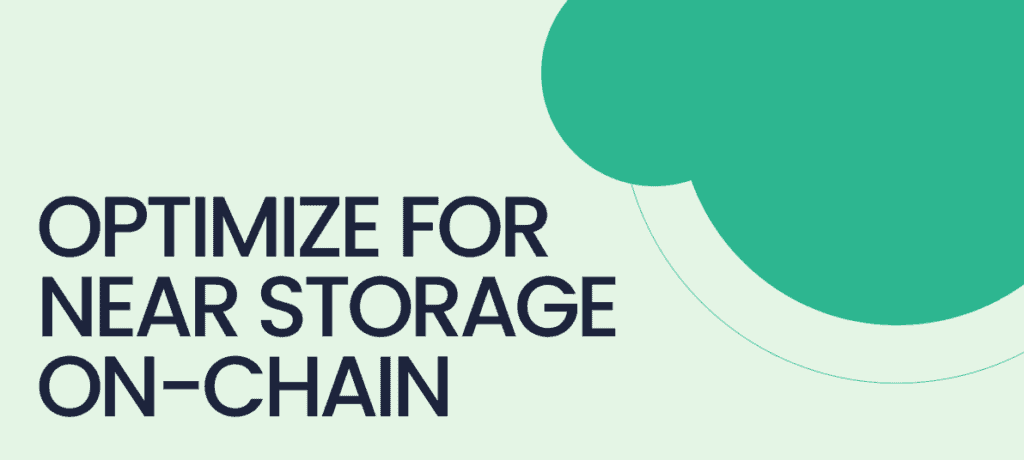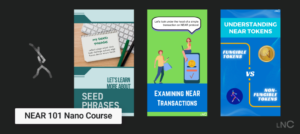The transition to web3 seems inevitable. Several companies have already started experimenting with the various facets of web3, such as NFTs, metaverse, and tokenization. However, how do we smoothen this transition? At Learn Near Club, the future of web3 can be reached by incorporating web3 tooling into proven and open web2 platforms. One of the best examples of a “proven and open” web platform is WordPress. In this blog, let’s see how WordPress fosters decentralized growth within its centralized framework.
What is WordPress?
WordPress is a popular open-source content management system (CMS) that enables users to create and manage websites and blogs. Since its release in 2003, it has grown to be one of the most widely used website platforms, powering about 43% of all websites on the Internet.
One of the key reasons for its popularity is its user-friendly interface that does not require users to have any coding knowledge. This has made it a popular choice for those who want to create and publish content easily. Additionally, a large community of developers has created numerous plugins and themes, which can be easily integrated into the platform, providing additional functionality and aesthetic appeal.
WordPress is highly customizable, which means it can cater to a wide range of websites, from small personal blogs to large corporate sites. It is also scalable, which allows it to grow in tandem with a business or website’s growth. The platform has the ability to add new features and functionality as required, making it highly adaptable.
Another advantage of WordPress is its SEO-friendly structure. Websites built with WordPress have a built-in SEO tool that enables users to optimize their content and make sure it is search engine friendly. This feature has made WordPress a preferred choice for many businesses and individuals who want their websites to be easily found by search engines.
The Philosophy of WordPress
The philosophy of WordPress is built on several core principles that guide its development and community. These principles are:
- Provide a user-friendly and accessible platform for anyone to create and publish content online. This means that the software should be easy to use, easy to understand, and free to access.
- Being open source, the software is freely available to use, modify, and distribute without any restrictions. This has helped to create a large community of developers who are constantly improving and building on the platform, adding new features and functionality.
- Encourage users to work together and share knowledge, which has led to the creation of a vibrant community of users, developers, and contributors who work together to make the platform better.
- Provide a tool that can be used by anyone, regardless of their technical expertise or physical abilities. This means that the software should be designed with accessibility in mind, making it easy to use and navigate for all users.
WordPress is focused on creating a platform that is open, accessible, and user-friendly, with a strong emphasis on community and collaboration. These core principles have helped to make WordPress one of the most popular content management systems in the world.
What is one of the key reasons for the popularity of WordPress as a content management system?
WordPress and Web3
Let’s look at the existing relationship between WordPress and web3. While WordPress is not inherently a Web3 platform, there are ways to integrate Web3 technologies into WordPress to create more decentralized and secure websites. One such way is through the use of decentralized domain name systems (DNS), such as Unstoppable Domains. You can also use decentralized storage systems, such as IPFS. IPFS is a peer-to-peer storage system that allows users to store and share files in a decentralized and censorship-resistant manner. By integrating IPFS into a WordPress website, users can create a more secure and decentralized platform for sharing content. Finally, website creators can always integrate crypto payment APIs to access decentralized payments.
WordPress is The Gold Standard
As you can see, WordPress is a flexible web2 platform that allows you to seamlessly integrate web3 technologies. There is a reason why the CMS is used by 38% of all internet websites for creating and managing different types of sites such as personal blogs, online stores, and more. This open nature has also allowed WordPress to create an open and vibrant community of contributors. These contributors work hard to improve the platform by developing new features, fixing bugs, and maintaining the core code. Anyone can contribute to WordPress, and there are many ways to do so.
How does WordPress align with the principles of web3?
How Contributors Help WordPress
- By reporting bugs, suggesting new features, and giving feedback on existing features, users help developers identify issues and make necessary improvements. This feedback is crucial for the continued growth and success of the platform.
- WordPress is available in many languages, but there is always a need for more translators to help make the platform accessible to even more people. One does not need to be fluent in multiple languages to help with translations – even small contributions can make a big difference.
- If you have coding skills, you can contribute to WordPress by writing code, fixing bugs, or developing new features. WordPress is an open-source platform, and anyone can access its code and contribute to its development. Depending on your skills and interests, you can contribute to WordPress core, plugins, or themes.
- You can also contribute to WordPress by helping with documentation, design, or community management. These areas are just as important as coding, and there are many opportunities to get involved.
- You can support the WordPress community by helping other users on forums, attending meetups, and organizing WordPress events. By supporting the community, you create a welcoming and inclusive environment that benefits everyone involved.
WordPress economy
According to a study by WPEngine, the worldwide WordPress Economy, which includes all the businesses, developers, and users associated with WordPress, was valued at around $596.7 billion in 2020.
Automattic, global distributed company behind WordPress.com with 1,983 Automatticians in 96 countries speaking 123 different languages, has ZERO offices.
Making money on WordPress is possible through various methods. Here are some of the best ways to monetize your WordPress website:
- Ecommerce: Use a plugin like WooCommerce to turn your WordPress website into an online store where you can sell physical or digital products, services, or appointments.
- Advertising: Display ads on your website and earn money through pay-per-click (PPC) or other advertising models. Google AdSense is a popular option for displaying relevant ads on your site.
- Affiliate Marketing: Promote products or services from other companies on your blog or website using unique affiliate links. You earn a commission for each sale or action made through your referral.
- Exclusive Content: Offer premium or exclusive content to your visitors for a fee. This can include articles, videos, courses, or other valuable resources.
- Online Courses: If you have specialized knowledge or skills, create and sell online courses through your WordPress website. This allows you to share your expertise and monetize your knowledge.
- Building Plugins: If you have coding skills, you can develop and sell plugins for WordPress. Many website owners are willing to pay for plugins that enhance the functionality of their websites.
- Building WordPress Sites for Clients: If you have web development skills, you can offer WordPress website design and development services to clients. This can be a profitable business if you can deliver high-quality websites.
Isn’t This The Very Ethos Of Web3?
By creating a model that’s heavily dependent on its community for improvement, WordPress has created a business that sits at the very precipice of web3. Remember, in a web3 environment, all operations are run and executed by a community instead of a centralized board of directors. WordPress pioneers that model as much as possible in a web2 scenario.
Moreover, WordPress creates endless opportunities for everyone who is willing to create real value for real users regardless of geographical location, political and economical conditions.
Here’s How Learn Near Club Contributes To WordPress journey to web3
We have created two plugins for WordPress, which allow users to connect with the Near ecosystem.
Login with NEAR

Easily setup and customize login with NEAR functionality at your WordPress site by using simple shortcode. Here are some features to keep in mind:
- Supports popular Near wallets like – “Near Wallet”, “My Near Wallet”, “Here Wallet”, “Meteor Wallet”, “Sender”
- Easy registration and login: If a user has a Near Wallet, he already can use all functionality from your site and is identified as WP User
- If your WordPress app uses NEAR smart contract the plugin allows users to create a functional limited access key for it. Also, users can make calls to change/view methods to other smart contracts
- The plugin also is easy to customize login UI.
If you want to create plugin with smart contract and call it from logged users you can simply do it in this way:
view method: await window.mainWallet.viewMethod({contractId: string, method: string, args: {} }
change method: await window.mainWallet.callMethod({contractId: string, method: string, args: {}, gas: number, deposit: number})
LNC Near Comments

Integrate and customize the LNC Near Comments plugin for your WordPress site by using the easy shortcode [lnc_near_comments]. Here are some features to keep in mind:
- Supports popular Near wallets like – “Near Wallet”, “My Near Wallet”, “Here Wallet”, “Meteor Wallet”, and “Sender”
- Provides a unique captcha for the comment section and posts user comments after a small tip transaction to the v1.ncaptcha.near smart contract
- Unique payment system allows you to receive a portion of the payment for each captcha solved by your users. You can configure the revenue on your side
- Tested and designed to work with the latest version of WordPress. Ensure your WordPress installation is updated before using the plugin
- The LNC Near Comments plugin requires the Near Login plugin to function properly. Please refer to the plugin documentation for any necessary dependencies and installation instructions.
To utilize the plugin with a smart contract and allow logged-in users to interact, use the following methods:
View method: await window.mainWallet.viewMethod({contractId: string, method: string, args: {} }
Change method: await window.mainWallet.callMethod({contractId: string, method: string, args: {}, gas: number, deposit: number})
In Closing
The intersection of web2 and web3 technologies presents a unique and exciting frontier for the digital world. Traditional platforms like WordPress have demonstrated their adaptability and relevance in this evolving landscape. By integrating web3 features such as decentralized domain name systems, decentralized storage systems, and crypto payment APIs, WordPress embodies a hybrid model, positioning itself at the forefront of the web3 revolution.
WordPress’s open-source, community-driven ethos aligns closely with the principles of web3. Its wide adoption, ease of use, and adaptability make it an ideal springboard for the transition into a more decentralized internet. By supporting and encouraging community contributions, WordPress fosters a web3-like environment in a web2 context.
If you are ready to participate in connecting NEAR to WordPress join this Telegram Group
Which of the following is not a way that users can contribute to WordPress?
Updated: April 28, 2025





Top comment
I didn't think about WordPress in that way.
Well, said @dakin.near!